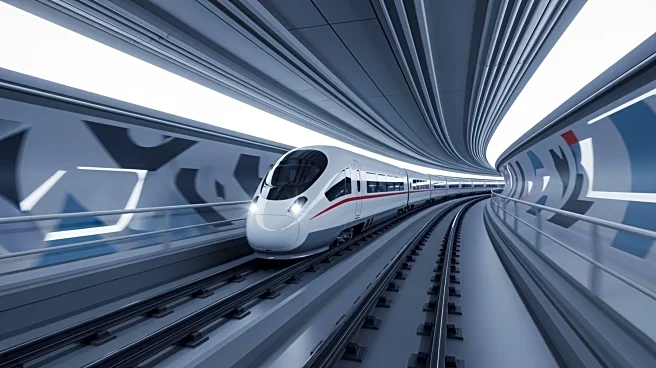What's Happening?
The European Commission has announced a comprehensive plan to expand high-speed rail networks across Europe by 2040. This initiative aims to significantly reduce travel times between major cities, enhancing
connectivity and supporting the EU's goals of carbon neutrality by 2050. The plan includes new cross-border routes and upgrades to existing lines, allowing trains to travel at speeds exceeding 200 kilometers per hour. Key routes will see travel times cut dramatically, such as Berlin to Copenhagen in four hours and Sofia to Athens in six hours. The expansion is expected to ease congestion, boost capacity, and strengthen Europe's security by facilitating the swift movement of troops and civilian freight.
Why It's Important?
The high-speed rail expansion is crucial for Europe's environmental and economic objectives. By reducing reliance on air travel and road transport, the initiative supports the EU's carbon-neutral goals, contributing to global efforts to combat climate change. Economically, the improved rail network will enhance Europe's competitiveness by facilitating faster and more efficient movement of goods and people. This infrastructure investment is expected to unite European countries, strengthen regional economies, and position Europe as a leader in sustainable transport solutions. The plan also promises to make travel more affordable and accessible, benefiting citizens across the continent.
What's Next?
Once implemented, the high-speed rail network will transform travel across Europe, with significant reductions in journey times between key cities. The European Commission will oversee the mobilization of investments and the construction of modern infrastructure to achieve these ambitious goals. As the project progresses, stakeholders including governments, businesses, and civil society groups will likely engage in discussions on funding, environmental impact assessments, and regional cooperation. The success of this initiative could set a precedent for similar projects globally, promoting sustainable transport solutions worldwide.
Beyond the Headlines
The high-speed rail expansion may have broader implications for European integration and cooperation. By improving connectivity, the project could foster greater cultural exchange and understanding among European citizens. Additionally, the initiative may influence urban development patterns, as cities connected by high-speed rail become more attractive for investment and tourism. The project also raises questions about balancing infrastructure development with environmental conservation, as construction may impact local ecosystems. Long-term, the success of this plan could inspire other regions to pursue similar sustainable transport initiatives.









